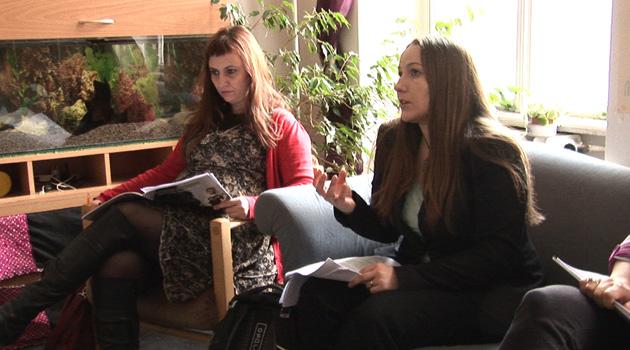Czech Helsinki Committee publishes shadow report on discrimination and racism

On the occasion of the International Day against Racism, the Czech Helsinki Committee (Český helsinský výbor – ČHV) has published a shadow report on racism in the Czech Republic and in Europe. The report is issued annually by the European Network against Racism (ENAR), an umbrella organization of hundreds of human rights groups from 26 countries.This most recent report maps the situation during 2011 and part of 2012. The English-language summary report, "Racism in Europe", is available here: http://www.romea.cz/dokumenty/SR_EU-2012.pdf
According to representatives of the Czech Helsinki Committee, the report describes essential problems with forms of discrimination and racism as they manifest themselves in the Czech Republic and concludes that prejudices and racism continue to be deeply rooted in Czech society. Anti-Romani sentiment, as manifested by anti-Romani demonstrations and protests, represents the greatest problem.
"Muslims in Europe are experiencing bad times, but in the Czech Republic the greatest problem is anti-Romani sentiment," said Ĺubica Turzová of the ČHV. Even though both the media and the public are criticizing the state for its insufficient response to this problem, the authors of the report believe there is a need to note that certain short-term solutions have been rather successful.
The shadow report criticizes the Czech Republic for the fact that a large number of Romani children end up attending "practical primary schools" designed for pupils with light mental disability. The Czech Republic continues to face international criticism for its insufficient implementation of the European Court of Human Rights judgment in the matter of "D. H. and others versus the Czech Republic", which condemned the disproportionately high representation of Romani children in the "practical primary schools" (previously called special schools). "A concept of inclusive education was presented in 2010, but for the time being the situation has not improved," the authors of the report write, adding that it is necessary to emphasize the significant role of NGOs fighting discrimination and racism in various areas of life, as they are partially compensating for the insufficient activity of the state.
This year ENAR focused primarily on Muslim communities in Europe, which they report are very diverse in terms of ethnic origin and social status. While Islamophobia is latent in the Czech Republic, it is nonetheless deeply rooted in society and projected onto society’s perceptions of Islam and Muslims. Nevertheless, the question of Islamophobia is not a significant political or societal problem in the Czech Republic.
ENAR President Chibo Onyeji made the following remarks on this occasion: "Today is also International Day of Happiness – an occasion to highlight that decision makers have a responsibility to ensure that ethnic and religious minorities in Europe also enjoy happy and fulfilling lives. The current climate of rising xenophobia and racist violence reflected in our Shadow Report findings should not obliterate the fact that, whatever our skin colour or our beliefs, we all strive for a better life,a better future, with better chances for our offspring. No special privileges are expected, but a clear political commitment to equality and inclusion for all people living in Europe is."
Linda Janků, one of the authors of the Czech shadow report, says the deteriorating position of Muslims relates to the longstanding, negative and tendentious reporting about Islam and Muslims in the Czech media. According to ENAR, Islamophobia is widespread in many European countries. Manifestations of Islamophobia include discriminatory behavior, violence, vandalism of Muslim buildings and protests against mosques even in countries such as Poland, where several Muslim communities have been settled and lived for centuries. Muslim girls and women are most affected as they face double discrimination on the basis of their faith and their gender. Anti-immigration and anti-Muslim demonstrations, backed and promoted both by ultra-right extremists and by some political parties, incite discrimination even more and prevent members of ethnic and religious groups from fully participating in the European economy and society.
Last year ENAR’s report found that racial discrimination and racism was increasing in Europe and that the economic crisis had worsened the situation. In the Czech Republic in 2010 and 2011, official institutions supporting human rights were weakened, the position of migrants was encumbered by an amendment to the law on foreigners, and Romani people were persistently discriminated against in education, housing and the labor market. The Czech Interior Ministry, on the other hand, has scored successes in the fight against right-wing extremists and a movement of people has arisen that has begin speaking out against racism.
According to ENAR, domestic populations in Europe often have negative perceptions of migrants, blaming them for living on welfare or stealing jobs. The report also notes that many long-term residents of various communities view Romani newcomers as responsible for rising crime. Politicians often feed of off such sentiment and support this prejudice.
"It is disturbing that neo-Nazism is part of government in several countries and that in most countries, the public is open to expressions of racism," the report states. The authors also note that anti-discrimination measures are being stinted because of budget cuts and the economic crisis. The data collected by civil society representatives across Europe show that discrimination continues to negatively influence the lives of many ethnic and religious groups, specifically in their access to the criminal justice system, education, employment, goods and services, housing, and police.